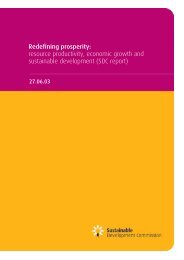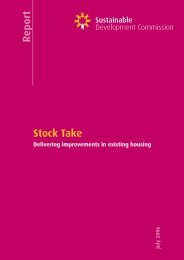Every Child's Future Matters - Sustainable Development Commission
Every Child's Future Matters - Sustainable Development Commission
Every Child's Future Matters - Sustainable Development Commission
Create successful ePaper yourself
Turn your PDF publications into a flip-book with our unique Google optimized e-Paper software.
Alignment of ‘key judgements’<br />
Although environmental concerns intersect with<br />
many of the ‘key judgements’ for ECM, the current<br />
inspection framework 135 does not signal the<br />
importance of these links to practitioners. While this<br />
can be addressed in part through the communications<br />
and guidance suggested above, the bigger question<br />
is whether the present key judgements are the right<br />
ones to evaluate the progress of ECM if sustainable<br />
development principles were to be applied.<br />
Here the picture is mixed: some judgements would<br />
no doubt be retained, but others would need to<br />
be modified or added. nef’s study, commissioned<br />
for this project, offered a variety of new factors<br />
that could be developed in the direction of key<br />
judgements. Based on these we recommend the<br />
following starting points:<br />
• Number of children and young people<br />
walking or cycling to school<br />
• Levels of air pollution (e.g. carbon monoxide,<br />
lead, nitrogen dioxide, particles, sulphur<br />
dioxide, benzene) present in residential areas<br />
• Distance of domestic dwellings from<br />
quality green space (or for new housing<br />
developments, amount and quality of green<br />
space per unit area)<br />
• Children’s sense of connectedness to<br />
(and understanding of) the natural world<br />
• Number of children and young people<br />
who engage in activities benefiting the local<br />
environment and community<br />
• Carbon emissions arising from public services<br />
per capita in local area.<br />
In addition to DCSF, other departments such<br />
as the DfT, Communities and Local Government,<br />
DH and Defra have an obvious role and interest<br />
in addressing the concerns set out in this report.<br />
Tackling children’s environmental wellbeing is a<br />
joint responsibility of many partners at all levels of<br />
government and public service.<br />
In brief:<br />
• DCSF to champion the need for a healthy and<br />
sustainable environment for children, working<br />
with other parts of government where policy<br />
interests are shared.<br />
• DCSF to ensure that adequate incentives are<br />
in place to enable local authorities and their<br />
partners to tackle children’s environmental<br />
wellbeing.<br />
• DCSF to provide communications and<br />
guidance to local authorities and their<br />
partners on championing children’s<br />
environmental wellbeing. The guidance<br />
should position sustainable development as<br />
a mode of delivering ECM, not an additional<br />
responsibility.<br />
Example<br />
Yorkshire & the Humber region developed<br />
a strategy for embedding sustainable<br />
development in education as far back as 2000.<br />
Supported by an active Forum of regional<br />
bodies and education practitioners, a full-time<br />
coordinator supports the implementation of<br />
the strategy working closely with the regional<br />
Government Office and Yorkshire Forward.<br />
This arrangement has proved effective in raising<br />
awareness about government initiatives like<br />
sustainable schools, as well as stimulating local<br />
partnerships and solutions.<br />
<strong>Every</strong> Child’s <strong>Future</strong> <strong>Matters</strong> 47








